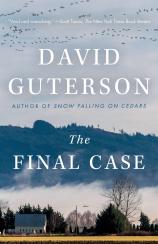Excerpt
Excerpt
The Final Case

Pretrial
A while back, I stopped writing fiction. I’ve been doing it for a long time, I’m not interested anymore, there are other things in life, I’d be repeating myself—I became aware that thoughts like these, uninvited, unexpected, persistent, and gnawing, were proliferating in my head, and outweighed any urge to write fiction, at first by a little, so that I stayed in the habit, but then by a lot, so that I quit.
It was a strange development for me. My situation was unfamiliar. Perplexed at first, I puttered and tinkered. I read books long unread. I took walks that might aptly be described as putting one foot in front of the other while trying not to forget that it was time to change a furnace filter. I swam laps with my wife every Tuesday and Thursday morning in a public pool. About once a week, we went to see a movie; about twice a week, we ate lunch in a café. My life clearly smacked now of bourgeois retirement. Predominantly, I cleaned, organized, repaired, and refurbished, and so the weeks went past without any fiction writing. Some days, I was distressed to learn that it was noon already, but this perturbation, from the start, was mild, a pang at worst, or an ephemeral hollowness. More persistent was a vague intimation that, at the heart of every moment of living, something was wrong. That faded, until I was waking up each morning without giving fiction writing any thought or missing it. Fiction writing was behind me in full. There were other possibilities now. If that leaves you wondering about this book—wondering if I’m kidding, or playing a game, or if I’ve wandered into the margins of metafiction or the approximate terrain of autofiction—everything here is real.
One October Sunday afternoon, after I’d headed four rows of raspberry canes that still had leaves but were shedding them as I culled, my father called me. Two things, he said. First, a tree had fallen in his yard. Second, he’d had a minor car accident. The downed tree, while a nuisance, could wait indefinitely. The accident, though, was a problem, because his car was undrivable and he had to be at work in the morning.
“No,” he said, “I didn’t get hurt. No one got hurt. That’s on the bright side. On the downside, I’m at fault. I know that. I can’t blame someone else. I plowed into a parked car. I turned a corner and plowed into a car, and I sat there thinking, ‘I know what this means. It’s the beginning of the end for me.’
“Your mother,” my father went on, “had a series of parking-lot scrapes, and then a serious fender bender, and the result is, for about two years now, she hasn’t gotten behind the wheel of a car, which you know, of course, and anyway we only had the one car, and now it’s unusable. We’re okay, though, in broad terms.”
My parents were okay—in broad terms. They still lived in the house where they’d raised me and my sister—a brick saltbox with brick windowsills and a wrought-iron railing on one side of the fissured concrete risers outside their front door. It was full of failed windows with permanently obscured panes, and hemmed in by bushes irregularly trimmed. It had a half-basement crammed with objects put aside for a future dispersal that never came, and a roof that leaked where it met a chimney penetration. The rooms were low-ceilinged, the interior doorways trimmed by scant casing. Light fell across everything in a desultory fashion—across the ceramic figurines on the side tables, across the heaped-up matchbox collection, and across the sideboard with its display of blue-and-white Delft crockery. My parents, in their eighties, had gravitated toward their combination kitchen/dining room as the stage on which their lives would play out. They’d installed a half-sofa and a small television there, cramping the room with this modest arrangement. It was a bit of a feat to slip around the table where they took their meals and into the nest they’d made for themselves beneath a window—a window against which, at the moment, as my father explained, the whip ends of branches were curled in the aftermath of tree fall.
I went to their house. It wasn’t hard for me to do so. I lived about fifteen minutes away by car, which you could say sounds depressing—staying in the approximate neighborhood of your youth for your whole life. I wasn’t down about it, though. In fact, I liked it. Plus, I would have moved if there’d been a reason for it, like a job, for example, or because my wife wanted to. My sister had also stayed put. She’d stayed in Seattle, and had said about that, more than once, “Why move?”
The toppled tree in my parents’ backyard was a spruce that had succumbed to a recent windstorm. About a third of it had cracked off and now lay with its branches either spearing the earth or rising like bristles. Bark, needles, and cones littered the patio, and an acrid scent of resin hung in the air. I went to work with a chain saw until a reasonable neatness had been reintroduced, and then my father and I ducked into the cedar-shingled shed at the rear corner of my parents’ lot—ramshackle and dilapidated, with a duff-filled, detached gutter—to look at his car, which was emphatically crumpled on the driver’s side at the front, where a headlight dangled sadly. “What happened,” he said, “is that by the time I got home—and this accident occurred just two blocks away—all of the water had come out of the radiator. So now it has to sit here until I figure something out.”
The Final Case
- Genres: Fiction, Literary Fiction, Suspense, Thriller
- paperback: 272 pages
- Publisher: Vintage
- ISBN-10: 0525563113
- ISBN-13: 9780525563112



